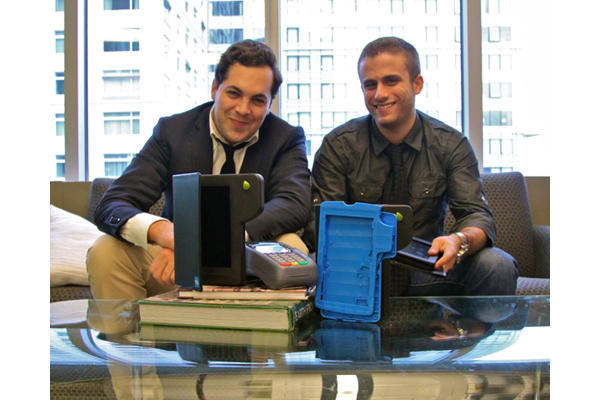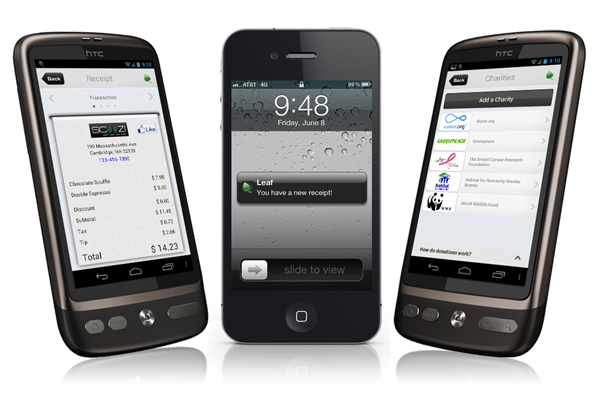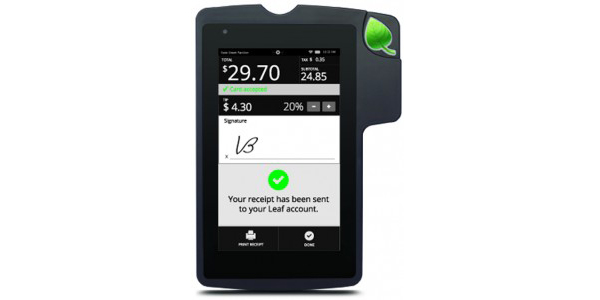One Man’s Receipt Is Another Man’s Treasure
 Leaf cofounders Aron Schwarzkopf (left) and Sebastian Castro Galnares. (Photo courtesy of Leaf)
Leaf cofounders Aron Schwarzkopf (left) and Sebastian Castro Galnares. (Photo courtesy of Leaf)
“Would you like a receipt?” a cashier asks with his hand practically reaching for the garbage already. It’s a question heard so often that customers either spout off a “no” without thinking, or say “yes” and immediately stuff the tiny piece of paper into the abyss that is their wallet.
In an age when smartphones rule and 12-year-olds own iPads, receipts are out of place. They clutter desk drawers and trashcans. Their potential goes to waste—literally.
That is, until Aron Schwarzkopf gets his hands on them. A 2010 Babson graduate and CEO of the Cambridge-based company Leaf, Schwarzkopf has created an app that not only sends a paperless receipt to your phone with each credit card swipe, but from that very receipt, the customer can rate their experience at whatever coffee shop, restaurant, hair salon (you name it) they’re in. They can then “like” the business on Facebook, receive special discounts, and select a charity to which Leaf will donate a portion of their profits. It takes elements of online shopping and implants them into the customer’s in-store visit.
With help from cofounder and COO Sebastian Castro Galnares, an MIT grad, and their diverse team of tech wizards, Leaf is gaining momentum among Boston’s businesses, and seeks to give brick-and-mortar stores a chance to compete in this ever-expanding digital world.
 The app is one part green, one part personal, and one part philanthropic. It’s a recipe for success, as seen by the 25 businesses that have already jumped onboard since the company’s January 2011 beginnings.
The app is one part green, one part personal, and one part philanthropic. It’s a recipe for success, as seen by the 25 businesses that have already jumped onboard since the company’s January 2011 beginnings.
For merchants, Leaf allows them to collect feedback, track everything from revenue to what dish is most popular, and generate loyalty by giving preferred customers rewards (without the clumsiness of coupons or cards). It establishes a better relationship with consumers and doesn’t require merchants to change their payment provider. By adding the app to their current point-of-sales (POS) system, they can access transaction data in a user-friendly format. All the information is stored securely and can be managed from anywhere (computers, smartphones, etc.).
“I remember one business owner I talked to who thought that if he didn’t print out all of his receipts every night, he wouldn’t get the money,” Schwarzkopf says. “It’s just not necessary.” He wants to show merchants how much simpler things can be by introducing them to a program that organizes their inventory for them and helps grow their business.
And that’s exactly what’s happening at CasaB in Somerville’s Union Square, a new Spanish restaurant that has been with Leaf from the start. They’re taking full advantage of Leaf by upgrading their POS system to the custom terminal that the team created. It replaces a typical credit card terminal with a sleek tablet that resembles a Kindle.

A recent trip to CasaB proved how seamlessly Leaf can be integrated into a business. The staff carries the small tablet with them, from which they take orders (the restaurant’s entire menu is uploaded into the system), and at the end of the meal, the guests simply swipe their credit card on the side of the tablet, enter the tip amount, and sign with their finger. Compared to the usual frantic scribbling of a waiter on his notepad, and confusion over how to divide the bill (the tablet’s got you covered there—huzzah!), Leaf is an effortless paperless process.
And the same goes for other retailers. By switching their out-of-date credit card terminals with the tablet, their transaction data is recorded digitally, and customers have a simple, innovative payment experience.
Using the tablets has led to faster service and less mistakes while taking orders, according to CasaB owner and designer Angelina Jackovich. Once the order is placed, it is sent directly to the kitchen from the tablet—no more crowding around a computer screen or rushing from room to room.
“It’s a lot more efficient when I’m backed up,” Jackovich says. “I can communicate with the bar and kitchen without actually going to them.”
For Schwarzkopf, Leaf isn’t just about updating technology, though; it’s about creating a platform on which a higher level of familiarity can be reached. Or, as he puts it: “We’re turning receipts into handshakes.”
“People used to know their butcher or the guy at the coffee shop, but not so much anymore,” Schwarzkopf says. “We want to connect local businesses to their customers and empower both to talk to each other.”
Perhaps, the next time you’re asked the inevitable “Would you like a receipt?”, the response should be, “Have you heard of Leaf?”

